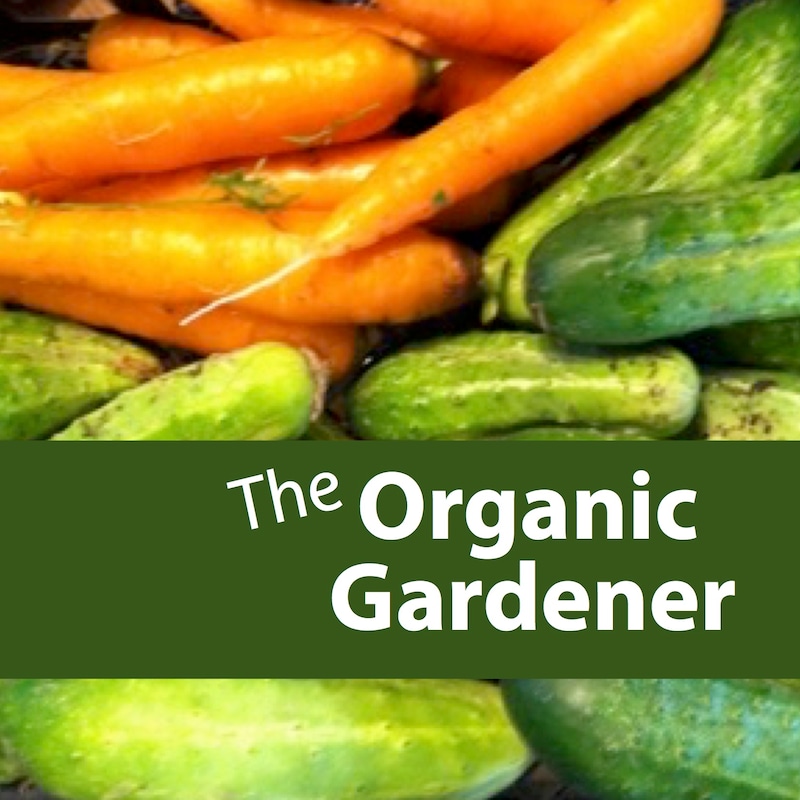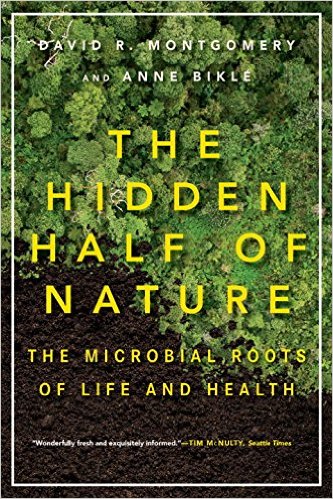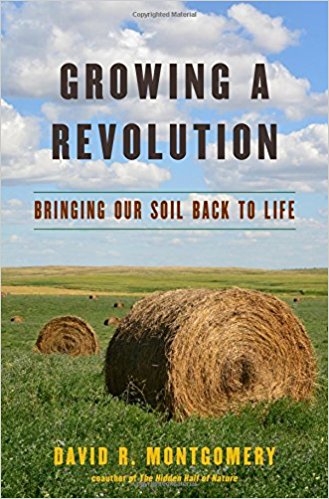
Shownotes
Growing a Revolution: Bringing Our Soil Back to Life | “Where good Stewardship meets economic gain” pg 24. David Montgomery | Seattle, WA
2 brown thumbs;) to understand that joke and hear the pre-chat listen to the podcast itself on iTunes.
The Messengers DVD on Indiegogo
David R. Montgomery was born in 1961 Stanford, California, and studied geology at Stanford University before earning his Ph.D. in geomorphology at UC Berkeley. He teaches at the University of Washington where he studies the evolution of topography and how geological processes shape landscapes and influence ecological systems. He loved maps as a kid and now writes about the relationship of people to their environment and other things that interest him. In 2008 he was named a MacArthur Fellow. He lives with his wife Anne in Seattle, Washington.
Tell us a little about yourself.
I’m a geologist by trying
major hobby and passion
she’s a biologist
looking at plants and the role of microbes
I’ve gotten into gardening by looking over her shoulder and enjoying the fruits of what is happening! Watching how she transformed it from the lawn to nice garden
The New Book looks at translate the principals of we learned by watching our yard come back to life here in North Seattle where we live. How to translate that to larger scale farms and the way how ag can embrace and apply these same practices and principles that worked so well in our yard to revolutionize and transform agriculture adn take it from an environmental problem and all the major problems that are associated with agrochemical intense agriculture and transform agriculture in ways that are practical can maintain yeilds have a much lower environmental footprint
The book really chronicals my journey visiting farmers around the world who are applying these and principals b
bringing their soil back to life the way Anne did to our yard.
iI knew as soon as I saw your book on amazon my listeners I call them green future growers becasue they are growing us a greener future and this is what it could be.
Tell me about your first gardening experience?
my primary love of garden come from helping Anne in the garden and absorb her passion
grow
I forget to water them I’m not the best plant parent
Right?
But Anne’s a plant whisperer
renting an apartment
transformed the whole place
came to an appreciation of the power of that experience
not only for an individual for the gardener and their love and joy of doing it, but the way their experience can rub off on others
experience what a good gardener can create.
It’s almost like the book the secret garden and how the garden can transform another life. When the kids play in the bucket of worms in my classroom I can’t hardly keep them out of them.
How did you learn how to garden organically?
We’re hardwired to like nature
dealt out of that
little bits of nature
can connect us with our deep roots
evolutionary roots
vision and senses all come together in terms of experiencing nature
I like to view our garden now as a little bit of that whichconnects us with the broader world. I ca’t believe how much time I spend in the non rainy season, in the spring or summer. We have really moved outside 3-6 months in our outdoor living room.
I can tell you about all that
fun book to research
observations I made as a geologist
I worekd all over the world that
studies soil erosion
techie
geomorphologist someone who studies the surface forms of the earth
topography and how it forms
if you do that enough and look at erosion like I have
sculpts terrain and topography you start recognizing patterns
looked at the soil erosion shaping the longevity of human civilizations how
farming practices had destroyed the soil after
follow human history and region after region
affects our history
little of that is taught,
none of it’s learned in school
personal observations
looking at the archeology
final chapter was kind of depressing … chronologically of societies unable to feed themselves. Had to rewrite the end 3 times and then I sort of put the subject aside
started seeing the and we talk about in
She was able to restore the soil in our yard
Turn it from essentially dead dirt into thriving rich soil.
Over the course of a decade she changed our soil.
So counter to what I had seen about the destruction of soils, so I started to pay attention and perk up and go wait a minute!
We can rebuild soil fertility sort of fast here
Microbial life feeds plants
Importance for human health all played out in the book that we wrote together
The Hidden Half of Nature
What if we applied these principles to?
- farming
- gardens at large
- gardens that feed us all
- different kind of gardening
There’s definitely a big difference from a garden feeding a family of four to a farm feeding 150 CSAs to large scale farming.
In Growing a Revolution: Bringing Our Soil Back to Life
I wanted to ask the question:
Could the things that Anne had done to our yard that were so transformative could that be done at scale on big farms? On:
- big industrial farms that we have in North America
- family farms
- small subsistence farms in Africa
I wanted to know how applicable the things we were looking at were. So I started traveling around the world to visit farmers who had literally transformed their soil. Had brought their farms back to life. Taken land was degraded
Something like 1/3 of all farmland in the world has seriously degraded soil!
How do we keep feeding an 8, 9 billion, 10,000,000,000 person planet
Having soil that was degraded was not the way to do it!
So I wondered
- can we reverse that?
-
does it make economic sense?
-
Knew it made environmental sense to do it. But could it be done practically and economically?
It seems like the answer is yes!
Organic-ish
From one’s own garden all the way up to very large farms, that aren’t necessarily organic in nature but that I like to call “organic-ish” because the farmers, many of the conventional Farmers who had adopted these principles and used them for the years.
They had kind of weaned themselves off of most agro-chemicals.
They were getting more organic in nature but that was not their intent they were just finding that they
- didn’t need all the chemical in their own soil which
- all the fertilizer
- the herbicide
- insecticide
they didn’t need them if they adopted these practices and tailor their own environmental technology level to their own soil… There’s a lot of variables
But the principles are what I organized the book around my trip to see famers who were doing it well who were having success in improving their soil and returning the profitability to their farm. And radically lowering their environmental footprint
Some were completely organic but most were intentionally not completely organic or not organic started as conventional farmers but by the time they had restored their soil the difference was getting pretty narrow. It was really interesting.
I know listeners are probably dying to hear what can they do to restore their healthy soil, if they are trying or haven’t even gotten started yet. Where are some of the places you’ve been.
I went to:
- Latin America,
- Costa Rica
- Africa to Ghana
- South Africa
- American Midwest
- North Dakota
- South Dakota
- Ohio
- Pennsylvania
- Saskatchewan, CA
A wide range of farmers who had a wide range of crops some who had
- crops
- livestock
- commodity crop producers.
It was interesting and informative set of farmers. I intentionally selected a biased set. I wasn’t trying to visit the average north american or average African farmer.
I was trying to visit people who had really restored their soil and figure out how they did it.
some of the farms went to in Africa were no bigger then our urban lot in Seattle. People were feeding themselves. They had really no access to capital but they had their own labor.
So the idea that you could bring fertilizer intense green revolution of agriculture to these farmers wasn’t gonna work because they didn’t have the money for fertilizer and patented seeds.
They needed a style of agriculture that they could implement themselves.
Center for No-till Agriculture
Kumasi Ghana
Masters degree in Nebraska looking at no-till farming. and then came back and adapted to practices in Ghana
What he’s done is taken his farm and turned it into a teaching farm
show them how he was doing things and how much it had
- reduced erosion off of his fields
- improved the quality of his soil
- doubled crop yields
going from traditional practices essentially slash and burn
clear burn, plant, go away for 10-20 years farm another piece of land while nature rebuilt the fertility etc. That works great if you have a low pop density but if you have a lot of people you run out of land…. can’t keep doing that practice
part it relied on
jungle growing plants up and rotting and returning nutrients to...






